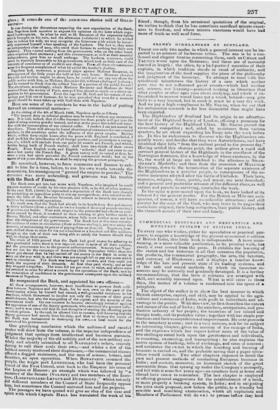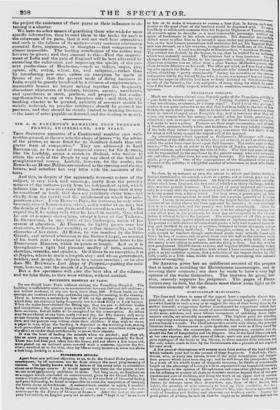COMMERCIAL RESOURCES AND MERCANTILE AND MONETARY SYSTEMS OF BRITISH INDIA.
To every one who wishes, either for speculative or practical pur- poses, to acquire a knowledge of the present economical condition of British India, this little book is indispensable. A more unas- suming, or a more valuable publicatiun, in its peculiar walk, has rarely it' ever issued from the press. It exhibits the teaming of the statist and the historian in all that concerus the population, the products, the commercial geography, the arts, the taxation, and currency of Hindustan ; and it displays a familiar know- ledge of the late and present state of its trading systems, and of the safe and sound methods by which its immense re- sources may be naturally and gradually developed. It is a further recommendation, that the facts it contains are arranged with skill, and sensibly reasoned upon. What is still Laver ia these dais, the matter of a volume is condensed into the space of pamphlet. The object of the author is to show the best manner in which British enterprise, capital, and skill, may be applied to the agri- culture and cunnnerce of India, with profit to iudividuals and ad- vantage to the public. With this view, he first describes the extent and nature of the soil of India ; the numbers, occupations, and pro- ductive industry of her people; the branches of her inland and foreign trade, and its probable value ; together with her staple pro- ductions and their susceutibilittesuf improvement. He next proceeds to the monetary system; and its a set y curious, and ter its subject an interesting chapter, gives an account of the coinage of India, and the expenses which her rupees (silver coins of the value of two shillings) entail both upon the government and individuals, in counting, examining, and transporting : he also explains the native system of banking, bills of exchange, and rates ot interest ; and estimates the extent to which the hoarding awl buiving of treasure is carried on, and the probable saving that a paper circu- latiun would induce. Two other chapters expuund m detail the past and present methods of conducting European busiuess in India; and contain, moreover, an historical sketch of the great mercantile firms that sprung up under the Company's monopoly, and tell with it some few years ago—us numbers both at home and abroad have came to remember. The last chapter is employed in uttering general suggestions for the establishment of a bank, or more properly a banking system, in ludia; and in suldectitig the joint stuck proposal, now befoie the public, to a friendly but sensible and searching examinalion, which all capitalists and Members of Parliament will do ae.1 to peruse beLte they lend
the project the assistance of their purse or their influence in ob- taining it a charter.
We have no other means of gratifying those who wish for more specific information, than to send them to the book; for such is the coherence of its parts, that it will not well bear separation ; and such is the fulness of its matter—every sentence containing essential facts, argumemts, or thoughts— that compression is almost impossible. The leading conclusions of the author may hoe ever be given; and they amount to this—That the improve- 'tient of India and the gain of England will be best advanced by extending the cultivation and improving the quality of the pre- sent productions of Hindostan,—such as indigo, sugar, rice, opium, silk, cotton, wheat, tin, and saltpetre,—rather than by introducing new ones, unless an exception be made in favour of tea : that the present mode of doing business in India would be greatly benefitted by a division of employments,— mercantile houses no longer mixing together the frequently discordant characters of bankers, brokers, agents, merchants, and speculators in stock, produce, and property, but confin- ing-themselves to one or two branches only : and that, in any banking charter to be granted, publicity of accounts should be strictly enforced, no peculiar privileges should be granted the partners, and they should be strictly limited to banking business —the issue of notes payable on demand, and the dealing in tnoney.



























 Previous page
Previous page